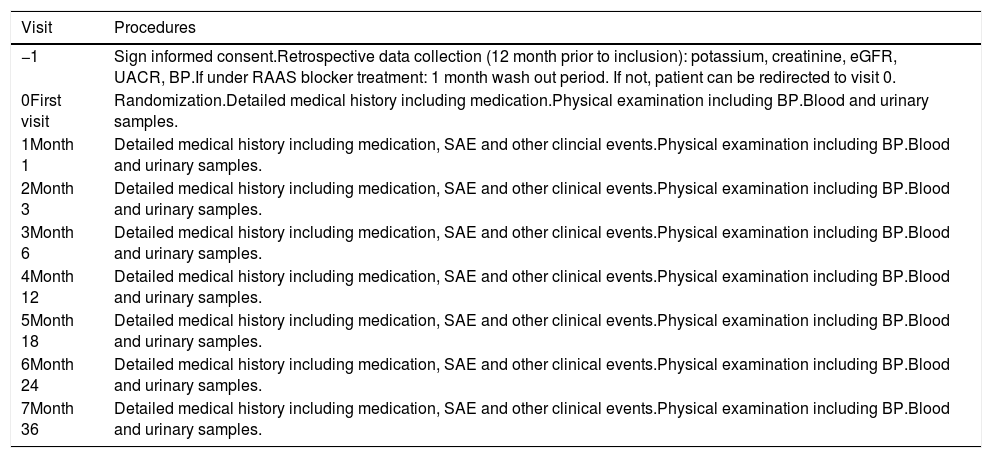Blood pressure (BP) control is fundamental to the care of patients with chronic kidney disease (CKD), and is relevant at all stages of CKD. Renin–angiotensin–aldosterone system (RAAS) blockers have shown to be effective, not only in BP control but also in reducing proteinuria and slowing CKD progression. However, there is a lack of evidence for recommending RAAS blockers in elderly patients with CKD without proteinuria. The primary outcome of the present study is to evaluate the impact of RAAS blockers on CKD progression in elderly patients without proteinuria.
Materials and methodsThe PROERCAN trial (trial registration, NCT03195023) is a multicentre open-label, randomized controlled clinical trial with 110 participants over 65 years-old with hypertension and CKD stages 3–4 without proteinuria. Patients will be randomized in a 1:1 ratio to either receive RAAS blockers or other antihypertensive drugs, and will be followed up for three years. Primary outcome is the estimated glomerular filtration rate (eGFR) decline at 3 years. Secondary outcomes include BP control, renal and cardiovascular events, and mortality.
Results and conclusionsThe design of this trial is presented here. The results will show if antihypertensive treatment with RAAS blockers has an impact on CKD progression in elderly patients without proteinuria. Any differences in BP control, cardiovascular events, and mortality with each antihypertensive treatment will be also clarified.
El control de la presión arterial (PA) es fundamental para los pacientes con enfermedad renal crónica (ERC) y es relevante en todos los estadios de ERC. Los bloqueantes del sistema renina-angiotensina-aldosterona (BSRAA) han demostrado su efectividad no solo en el control de la PA sino también en la reducción de la proteinuria y de la progresión de la ERC. Sin embargo, no existe evidencia para recomendar el uso de BSRAA en pacientes añosos con ERC sin proteinuria. El objetivo principal del estudio es evaluar el impacto de los BSRAA en la progresión de ERC en pacientes añosos sin proteinuria.
Material y métodosEl estudio PROERCAN (NCT03195023) es un ensayo clínico multicéntrico, abierto, aleatorizado de 110 pacientes hipertensos, mayores de 65años con ERC estadios3 y4 sin proteinuria. Los pacientes son aleatorizados 1:1 a recibir tratamiento con BSRAA u otros antihipertensivos y el seguimiento será de 3años. La variable principal es el descenso del filtrado glomerular estimado durante el tiempo de seguimiento. Las variables secundarias incluyen las cifras de PA, eventos renales y cardiovasculares y mortalidad.
Resultados y conclusiónEl diseño del ensayo clínico se desarrolla en el presente artículo. Los resultados determinarán si el tratamiento antihipertensivo con BSRAA tiene un impacto en la progresión de la ERC en pacientes añosos sin proteinuria. Así mismo, se aclararán las diferencias en el control de la PA, los eventos cardiovasculares y la mortalidad con los distintos tratamientos antihipertensivos.







